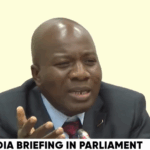
The Majority Leader in Parliament, Mahama Ayariga, has called for a thorough audit into tax exemptions granted to companies under the previous NPP government’s One District, One Factory (1D1F) programme, questioning the programme’s real impact on job creation and industrial growth.
Speaking at the Leaders’ Media Briefing in Parliament on Wednesday, October 22, Mr Ayariga said many of the factories touted under the initiative were not functional by the time the previous government left office on January 7, 2025.
He said that the programme, which was meant to drive industrialisation across all districts, turned out to be “more of a political slogan than a real sound policy.”
“Show me many of the so-called new factories that were functional as of January 7, 2025, when you were leaving office. How many of those factories?” he asked. “No new factories were ever functional as at January 7, 2025.”
According to the Majority Leader, the NPP government mainly relied on existing factories instead of establishing new ones as originally intended.
“In the end, what did we see? We saw you going to existing factories and getting them to come and apply. And then based on whatever consideration, you selected some of the existing factories and gave them huge tax exemptions, claiming that they were going to expand operations to create jobs,” he said.
Mr Ayariga disclosed that Parliament would call for an audit of the funds that companies gained through those tax exemptions to verify whether they were actually used to expand production.
“We are going to call for an audit of the monies that they gained by the tax exemptions, and to see if indeed that money went into expanding their operations in the first place,” he said.
He further criticised the implementation of the 1D1F programme, noting that the lack of a raw material base made many of the factories unproductive.
“You did not take the time to establish the raw material base for the factories, so many factory structures were constructed, but could not be functional because they didn’t have the raw material base,” he explained.
The Majority leader also questioned the number of sustainable jobs created through the initiative. “If I challenge you to show how many jobs were created beyond the actual jobs of constructing them how many jobs were created in actually running factories you just won’t be able to produce significant figures,” he said.